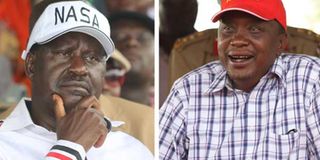It’s a pity politicians opted for mud instead of issues; don’t let them get away with it

Nasa leader Raila Odinga and Jubilee's Uhuru Kenyatta. PHOTOS | FILE | NATION MEDIA GROUP
What you need to know:
- It should be a foregone conclusion for Nasa to pin down Jubilee with proven sleaze, wastage, incompetence and non-delivery on pivotal manifesto pledges.
- Nasa has forced the Independent Electoral and Boundaries Commission and the government into the spotlight and onto the defensive like never before.
- In 1988, though Kenya was a one party state, the General Election was rigged on an industrial scale.
Discourse about Tuesday’s General Election has been dominated not by the government’s four-year record, but Mr Raila Odinga’s record fourth run for the presidency; not the bloated public wage bill and wastage in governments, but laying to waste Mr Odinga’s reputation; not about the great Vision 2030, but whether it could be free and fair.
It should be easy and gratifying for Jubilee, which claims the government it runs has out-performed any since independence, to extol its virtues and values and broadcast its achievements from every rooftop in Kenya.
But it has found it easier to mudsling Mr Odinga, the National Super Alliance (Nasa) flagbearer, than trumpet its scorecard.
It should be a foregone conclusion for Nasa to pin down Jubilee with proven sleaze, wastage, incompetence and non-delivery on pivotal manifesto pledges.
But the coalition has made a fetish of accusing Jubilee of planning to rig the poll than point out how a Nasa government will benefit from inclusivity which is non-existent in Jubilee.
POLITICAL EDUCATION
What are the effects of the foregoing? One, it should pressure fact-based middle class interests, think-tanks, party supporters, media, civil society and the thinking public to fill the resulting vacuum and influence opinion, decision and choices for Tuesday.
This has not happened because politicians and politicking, and not political education, rule the electioneering roost.
As was amply demonstrated in the search and advent of political pluralism and the long clamour for a new constitutional order, educating the public is not part of a politician’s job description or terms of reference.
The politician is hardwired to mislead in order to lead or, as does a lion, stampede the herd to take advantage of the ensuing chaos.
Is there a contradiction here? Part of a political party’s responsibility is educating the electorate. Parties should explain to the membership and electorate the burning, dominant and topical issues of the day.
POLL RIGGING
There is not a better time to do that than at election time because the party’s stall is judged against the competition’s and, educators don’t have to be politicians.
Two, Nasa has forced the Independent Electoral and Boundaries Commission (IEBC) and the government into the spotlight and onto the defensive like never before.
It has reminded all of Kenya’s sordid history of poll rigging and violence and pushed the public into that quinquennial state of apprehension, tension and despondency.
As I say, elections are winner take all, loser get nothing affairs or, put another way, zero sum games.
This makes them tinderboxes should a whiff of wrongdoing be imagined let alone detected.
The ensuing damage is, of course, colossal which is why 1988, 1991 and 2007 should forever serve up useful lessons for Kenyans.
SIXTH PARLIAMENT
In 1988, though Kenya was a one party state, the General Election was rigged on an industrial scale.
The immediate result was the Sixth Parliament; it was Kenya’s most weak-kneed legislature and a veritable House of sycophants.
The second result was the turmoil of the 90s occasioned by the clamour for political pluralism, inclusivity and a new constitutional order.
Politically instigated violence broke out in the Rift Valley in 1991.
It gathered momentum ahead of the 1992 General Election, through 1994 and recurred in 1997, also an election year.
It was aimed at redrawing the electoral map by expelling non-Kalenjin people; forcing them to vote for Kanu and or browbeating them into not voting.
FOREIGNERS
Thought to support multi-party politics, non-Kalenjins were branded undesirable and anti-government foreigners.
Also in 1997 violence unexpectedly erupted in Likoni at Kenya’s coast.
The aim was to drive out upcountry people (wabara) who were thought to support the opposition. But the dislocation and displacement, deaths and damage wreaked by the pre-election violence of the 90s paled in comparison to the post-poll plunder and murder, mayhem and madness of 2007/2008.
Pre-election violence was a poll rigging strategy; post-election violence was a reaction to vote fraud.
FRAUD
In 2007, Kenyans queued up, voted and sat back to wait for the results.
The polls umpire was complicit in fraud and has blood on its hands for the dead and unborn not only turned up but voted.
It is why the declared result of that presidential poll still rankles and why IEBC must on Tuesday deliver a credible General Election and ensure Kenya’s peace endures.
As for you mwananchi wa kawaida, turn up and vote; massive turnouts render decisive results and frustrate riggers. Last, henceforth, our campaign discourse should be driven solely by issues.
Opanga is a commentator with a bias for politics [email protected]





